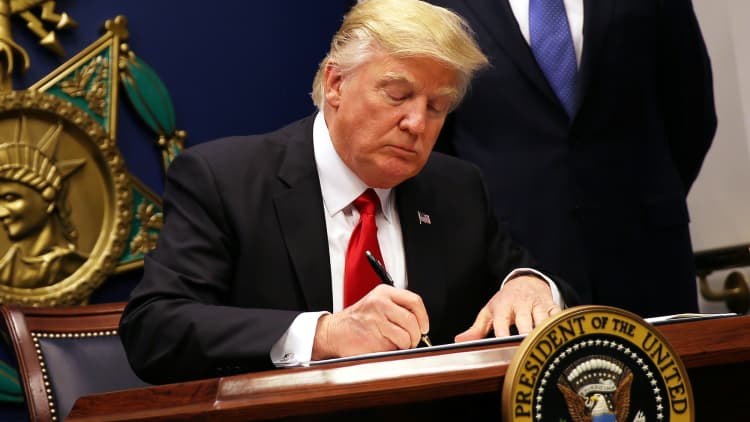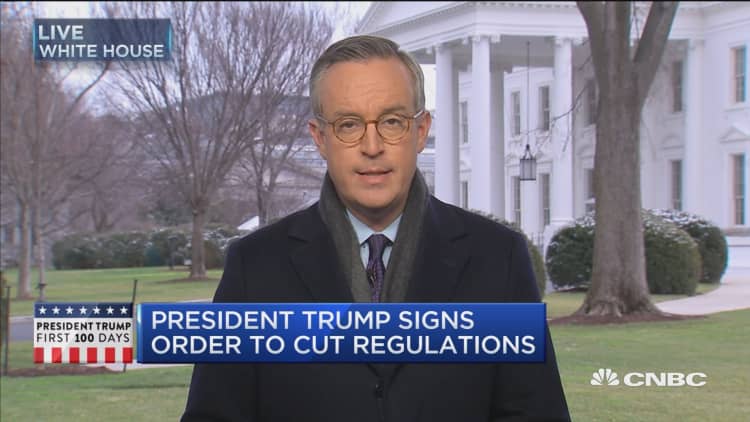
The Trump trade has turned into a Trump tantrum.
The uproar over President Donald Trump's travel ban on seven countries is making markets anxious, and traders are worried the policy will create divides among Republicans and divert attention from the Trump policies that pushed stocks higher, like tax cuts and increased fiscal spending.
They also worry it rings of a more protectionist tone that could be echoed in trade policy.
"If you say the market is 30 percent driven by fundamentals and 70 percent driven by the hopes and promises of the big three — tax cuts, infrastructure spending and deregulation, then the big three just got harder," said Art Hogan, chief market strategist at Wunderlich Securities. "If things continue to get messy in Washington, that process is going to take longer. That's what we're dealing with today."
Stocks were broadly lower Monday, with the and Dow off as much as 1 percent in their worst sell-off since Oct. 11. The dollar was weaker and Treasury yields moved lower in a slight flight-to-safety bid. The Dow transports were down more than 2.2 percent, and airlines were sharply lower. Delta Air Lines suffered a major computer outage Sunday, but all carriers were under pressure, with United Continental down more than 5 percent. "There was the issue with Delta, but it's more about whether does air travel get more complicated," said Hogan.

The sell-off, however, is more likely a temporary pause in a highly valued and complacent market, analysts said. It also comes in a week when the Fed is scheduled to meet, and while the central bank is not expected to take action, traders are discussing the fact that inflation is picking up, economic data is strong and the Fed could stick to its plan to hike interest rates three times this year.
"The market was set up for a pause at some point … I can't see this is going to dominate the rest of the year, take over the world economy and world earnings trend and become the ending event. I just don't see where this is going to be that. So I think this calms down or is watered down either way, and people move on to the next Trump volatility moment," said James Paulsen, chief investment strategist at Wells Capital Management. Paulsen said the sell-off could create a buying opportunity.
Stocks have been supported since the election by optimism that Trump's growth policies would be embraced by a Republican Congress and quickly adopted. Stocks held onto gains, and the Dow crossed 20,000 last week as markets focused on Trump's approval of two pipelines more than his threat to put taxes on Mexican imports and his spat with the president of Mexico over who would pay for a wall on the border.
Equities "were set up for perfection, and I think Trump reminded everybody that what you see is what you get, for better or worse," said Peter Boockvar, chief market analyst at The Lindsey Group. "If this becomes embedded, this has economic implications. Will technology companies get the best people? Will overseas countries respond in kind? Will it affect business? It's all part of the same U.S.-centric protectionism. I get the security issues, but it is still part of the mentality: 'Everyone is stealing our business. Every one is out to kill us, and we're going to close our borders.'"
To some extent, the markets may have rallied too soon and got ahead of the politics. … We said pretty consistently we do expect fiscal expansion and probably the best chance of tax reform that we've had for some time.Tina Fordhamchief global political analyst, Citi
Boocvkar pointed out that the market has basically moved sideways since mid-December, even with the Dow's run over 20,000 last week. The S&P at 2,272 is the same place where it was on Dec. 13. The sectors that benefited in the Trump rally were hard hit in Monday trading. Energy was down 1.9 percent, while materials were down 1.3 percent and financials were down 1.2 percent.
Analysts point out that Trump is literally following up his list of campaign promises with actions, while investors had focused more on the positive policies that could generate economic growth.
"It would appear that they're not the administration's priority. Now, we haven't changed our view that any of these polices aren't likely," said Tina Fordham, Citi chief global political analyst on CNBC. "To some extent, the markets may have rallied too soon and got ahead of the politics. ... We said pretty consistently we do expect fiscal expansion and probably the best chance of tax reform that we've had for some time."
Fordham said she expects those policies to take a while since they have to be approved by Congress, and they are still likely to be considered in the second half of the year. "I think this focus on security and social issues may start to give investors pause or thought," she said.
The ban, issued through executive order, drew criticism from tech company CEOs, who were already concerned that obtaining visas for foreign-born workers is too difficult. It also drew fire from congressional Democrats and Republican Sens. John McCain and Lindsey Graham, who have challenged Trump on other issues. The concern is that the ranks of the disenchanted will grow, and Trump's pro-growth agenda will get mired down in Congress.
Trump has said the ban is necessary for security and to prevent terrorists from entering the country. The order blocks refugees from entering the U.S. for 120 days. It bars citizens from Iraq, Syria, Iran, Sudan, Libya, Somalia and Yemen from entering the U.S. for 90 days.
"The more time and energy and political capital spent on immigration and trade, while not getting anywhere on tax reform, the more the market worries," said John Briggs, head of strategy at NatWest Capital Markets. Briggs said that the administration may be waiting for Trump's Treasury secretary pick, Steven Mnuchin, to be approved before turning to taxes. He said the bond market is following the stock market. "It's a pretty minor move. This is a pretty big week for data, the Fed and all that. There's a lot of uncertainty out there. I think risk is light, because they want to see what comes out of the wash with politics and the data."
Briggs said it's disappointing there's been no action on tax reform.
"We're 10 days in, and we've seen nothing except the border tax, which is going to be higher prices for consumers. If we don't have anything by the end of the week, I'll be personally disappointed," Briggs said. "I feel like if you get another seven days under your belt and you still don't have anything out of it but immigration, trade and taxing Mexico, you just have to wonder what the priorities are."


